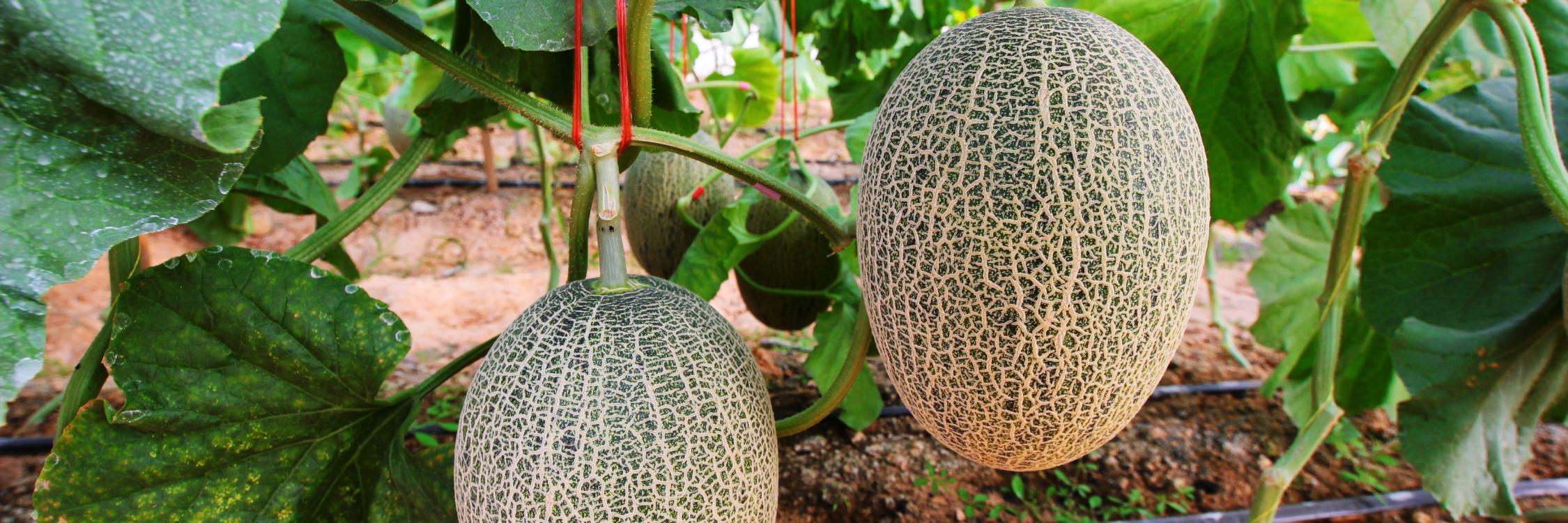
Did you know this about growing melons?
Mineral nutrition of melons
1:0.7:2 is usually considered as the best ratio for a balanced fertilization. The mineral nutrition as well as water management should be carried out in accordance with the cropping system, soil analysis, and the production target. Melons prefer deep, light and well-drained soils. Outdoor crops require per hectare 80-120 kg N, 60-80 kg P2O5, and 150-200 kg K20, whereas higher production in greenhouses requires up to 400 kg N, 200 kg P2O5, and 700 kg K20. Melons are particularly sensitive to micronutrient deficiencies, especially molybdenum.
Traditional field cropping is the most important method of cultivation and nowadays water management through drip irrigation is widespread. Fertilization takes advantage of this particular cropping technique by using soluble fertilizers and the technique of fertigation in order to adapt application timing to the instant requirements of the plant.
The importance of potassium
Potassium is particularly important at the flowering and fruit development stage.Application timing is of great importance when it comes to marketable production. This was illustrated in an experiment that compared potassium applied throughout growth through fertigation (T1), soil application at planting (T2), the farmer practice (T3), and a combination of soil application and fertigation (T4), for the same amount of fertilizers. Fertigation is the best way, even when it is only used to deliver a part of the fertilizer, particularly when it comes to the marketable part of the production.
Among the major elements, potassium plays a key role in sugar synthesis and translocation, and it also reduces the risk of bursting. Potassium deficiency is characterized by brown necrosis on leaf edges and fruits are gritty and bitter.
What source of potassium?
The cropping system and climatic conditions are the main criteria for the choice between the different forms of potash. Under semi-arid conditions or with drip irrigation, Sulfate of Potash (SOP) is the preferable form. This is because its impact on fruit size results in a higher marketable production.
As regards quality parameters, SOP increases both hardness and sugar content. Therefore, melons produced with SOP are sweeter. An investigation into consumer preferences has shown that taste is the main criteria for the choice of melon, in a much more important way than for any other fruit or vegetable.
Sulfate of Potash also contains 18% S, which is the main component of amino acids and vegetal proteins. It performs the role of enzymatic activator and participates in chlorophyll synthesis.
SoluPotasse® use in melon production
An experiment carried out under drip irrigation shows the benefit of SoluPotasse, soluble SOP, as compared to NOP. Melons fertigated with SoluPotasse have a higher percentage of ensuring dry matter, a better firmness, more sugar, and a more uniform production period.
A blind test involving 140 people regarding chemical analysis, demonstrating the advantages of SOP in terms of quality parameters and, as a consequence, its advantages in regard to taste.
K-Leaf® use in melon production
During fruit growth, the melon's demand for potassium is high and it may not be fully supplied by its roots alone. As described in an experiment carried out at the University of Texas during three growing seasons, foliar applications of K-Leaf can be of assistance. NPK soil fertilization was 100, 20 and 0 kg. ha-1 (soil rich in K). Foliar sprays of potassium were made on a weekly basis from fruit set to maturation at 4.5 kg K2O.ha-1 for each application. Soluble SOP treatment improved yield by 16% over control, 7% over MOP, and 19% over NOP. Sugar content remains the highest of all treatments.
More info about cultivation fruits and vegetables in our SOP Book.
Download our SOP Book